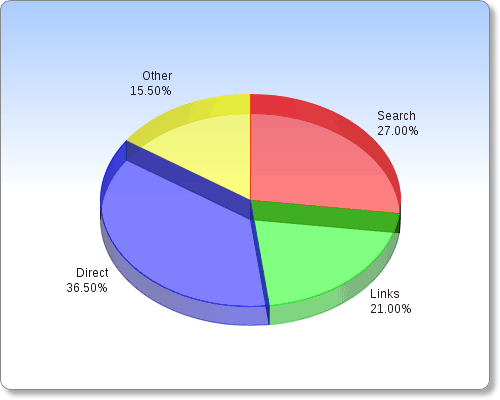Every second of every minute of every hour of every day there are 23,148 searches on Google; that’s a whole lot of searching…! Search is one of the most popular online activities, making Google the “number one” website in terms of traffic, brand recognition and financial success. Whatever you spend most of your time doing online, there is little doubt that search is massive.
So it is no surprise that businesses want to be found. They want to be on the front page of those Google results at the very least, preferably in the top three items listed and ideally, “number one”. After all, with all those searches happening every second, you’d want to be in front of all those eyeballs; it makes business sense.
Except for one thing – the data released by the Google Analytics team recently. Google Analytics anonymously collects information about visitors to many websites where the owners have allowed the search company to get basic data on, for instance, where the visitor came from, what pages they looked at and so on. Google has been quietly collecting all this data for a long time and so has a bank of information which clearly reflects how we behave online. The data demonstrates that searching for stuff is only a relatively minor reason people end up on particular websites.

Indeed, the vast amount of data in Google Analytics shows that only 27% of visits to websites arise via search. The biggest reason people end up on a website is the “direct” route – either people typed in the domain name into the browser address bar, or they have previously stored the site as a bookmark. Either way, the “direct” route is chosen by almost four out of every ten people who end up on a website. According to the Google data, a further 21% of visitors land on a website as a result of a link from another site, or from a social network. The remainder of visitors end up on a website from “other” sources, such as email marketing campaigns, display advertising or affiliate promotions. In total it means that, on average, around three quarters of people visiting websites get to them WITHOUT using search engines.
If a business focuses its online attention in “getting to number one on Google”, for instance, it is only really targeting a quarter of its potential. Relying solely on search marketing means you are missing out on traffic. Indeed, Google’s own data suggests you should be putting most of your effort into getting links, social media mentions and using email marketing more. In fact, if you did those three things INSTEAD of search engine marketing, you would end up with more visitors.
The data is in Google’s Newsletter Archive.
Related articles
- Google Analytics for Your Small Business (microbusiness.vistaprint.com)
- How to Get the Most Out of Google Analytics (mashable.com)


3 thoughts on “Search engines are less valuable than we think”
What is interesting about this is that if you focus on the areas other than search, as you mention, your search ranking will improve organically. The other activities are exactly what the search engines are looking for.
Hi Graham, I’m afraid your analysis is quite short sited – whilst the data Google has would far outweigh the data we have, it doesn’t reflect what we generally see – but parking that too one side – the metrics you don’t mention are things such as bounce rate ( usually much higher from links than good organic search ), new visitors vs returning visitors ( direct can be heavily weighted too returning visitors, whereas Organic can be brand new, juicy visitors ).
There is a valid point in there, in that website owners should not rely solely on search, and as Eric says above, in fact doing everything, and doing it well, will compliment each marketing stream.
Shaun
Hi Shaun, thank you for your comment. I wasn’t intending the article to be a “be all and end all” but merely to point out what you say and which Eric says, that search engines are not the ONLY method of getting people to websites. The problem is that when I visit companies I find it is nowadays the only thing they concentrate on. As for bounce rates – I agree, they vary according to source and so on – but whenever I ask companies what their bounce rates are, they generally have no idea what I am talking about. Few companies appear to measure or act on them, often leaving “all that technical stuff to our internet team” – who then have no ability to do anything about it. Many companies are merely collecting data for data sake. So, what I was trying to do with my article was to alert people to think about how they get people to their website. In essence, I am sure we are coming from the same direction on this.
Comments are closed.